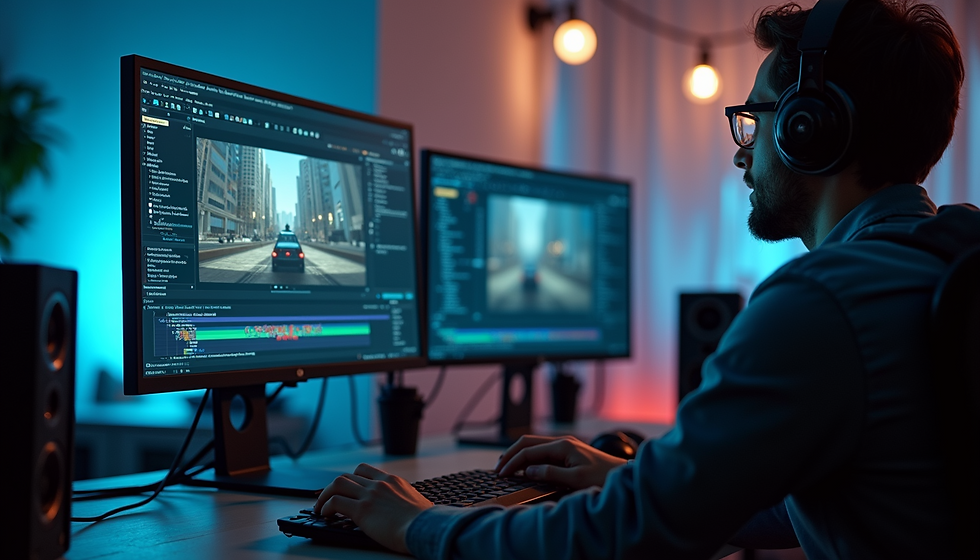The Ultimate Roadmap to Becoming a Game Developer in 2025
- Lab Of Games

- Jun 21, 2025
- 3 min read
Updated: Jul 3, 2025
Dreaming of building your own game? This 2025 roadmap breaks down every step — from learning the right tools like Unity or Unreal, to publishing your first indie title. Whether you're a student or a hobbyist, this guide will get you started on the right path.
The game development industry is booming in 2025, with indie studios, solo devs, and AAA teams all pushing the limits of creativity and technology. If you've ever dreamed of building your own game — whether it's a 2D pixel-art platformer or a stunning open-world RPG — there’s never been a better time to start.
This roadmap is your step-by-step guide to becoming a successful game developer in 2025. We’ll walk through the core skills, tools, and strategies you need to go from curious beginner to confident creator.
Step 1: Discover Your Game Developer Identity
Before you dive into engines and code, ask yourself:What kind of game developer do I want to be?
Game development is a vast space, with many different paths you can take:
Role | What You’ll Focus On |
Game Designer | Crafting gameplay systems and level layouts |
Programmer | Writing game logic, physics, AI, and mechanics |
Artist/Animator | Creating visuals, character animations, UI |
Sound Designer | Composing music, sound effects, ambience |
Indie Developer | A mix of all the above (often solo or small teams) |
Step 2: Choose the Right Game Engine
To start building games, you'll need a game engine — the software that powers your gameplay, visuals, input, and more. Two engines dominate the market in 2025:
Unity (C#)
Ideal for mobile, 2D/3D indie games, VR, and rapid prototyping.Great for beginners due to its flexibility, massive documentation, and active community.
Unreal Engine 5 (Blueprints + C++)
Perfect for high-fidelity 3D games, realistic lighting, and advanced systems like multiplayer and AI.Used by many AAA studios but still accessible for solo developers using Blueprints.
Start with Unity if you want faster results and more control with smaller projects.
Try Unreal Engine if you're aiming for cinematic visuals, complex mechanics, or long-term AAA ambitions.
Step 3: Learn the Fundamentals of Game Development
This is where your skills are forged. Becoming a game developer means learning both technical and creative aspects — scripting, scene design, UI/UX, sound integration, and more. Start with beginner tutorials:
Unity Learn or Unreal Online Learning
YouTube channels like Brackeys, Dani, Unreal Sensei
Courses on Udemy, Coursera, or Skillshare
Real Talk: You don’t need to master everything before starting. Build while you learn.

Step 4: Build Real Projects
Once you've grasped the basics, create simple playable games to cement your knowledge.
Try these:
A basic 2D platformer (jumping, moving, collecting)
A top-down shooter with enemy AI
A physics-based puzzle game
A basic dialogue system or RPG interaction
These projects give you hands-on experience with:
Input systems
Health/damage logic
Sound effects and background music
Menus and HUDs
The goal isn’t perfection. It’s to finish.
Step 5: Join a Game Jam
Game jams are short development challenges (usually 48–72 hours) where developers create games around a theme.They’re an incredible way to learn under pressure, test creativity, and meet other developers.
Popular game jams:
Ludum Dare
Global Game Jam
Itch.io Jams
You’ll improve faster in one jam than in a month of solo learning. And you’ll leave with a finished game to showcase in your portfolio.
Step 6: Share and Publish Your Work
Start building your online presence as a game developer.
Use platforms like:
Itch.io – for publishing your prototypes and finished games
Twitter/X – for sharing progress and networking with other devs
YouTube/Instagram/TikTok – for devlogs, reels, trailers, and feedback
Reddit – especially r/gamedev and r/IndieDev for feedback and tips
Bonus Tip: Write short devlogs on your blog (like this one!). Search engines love developer stories.
Step 7: Launch Your First Full Game
After small experiments and jam entries, aim to publish a full, polished game. It doesn’t have to be massive — but it should feel complete.
What a finished game includes:
Functional gameplay loop
Polished UI and sound
Intro and end screen
Working pause or restart system
No game-breaking bugs
Publish it on Itch.io or consider Steam Early Access if you’re ready to monetize.Even better: create a trailer and start building hype on social platforms.
Bonus: Must-Have Tools for Every Game Developer
Here are a few tools that’ll boost your workflow in 2025:
Tool | Purpose |
Blender | 3D modeling & animation |
Krita | Free alternative to Photoshop |
Audacity | Sound editing & voice clips |
Trello | Organizing game tasks |
OBS Studio | Screen recording for trailers |

